17 start with L start with L
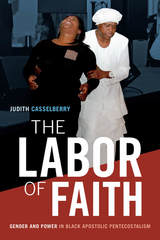
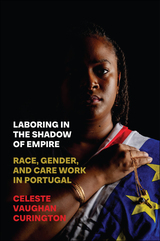
Laboring in the Shadow of Empire: Race, Gender and Care Work in Portugal examines the everyday lives of an African descendant care service workforce that labors in an ostensibly “anti-racial” Europe and against the backdrop of the Portuguese colonial empire. While much of the literature on global care work has focused on Asian and Latine migrant care workers, there is comparatively less research that explicitly examines African care workers and their migration histories to Europe. Sociologist Celeste V. Curington focuses on Portugal—a European setting with comparatively liberal policies around family settlement and naturalization for migrants. In this setting, rapid urbanization in the late twentieth century, along with a national push to reconcile work and family, have shaped the growth of paid home care and cleaning service industries. Many researchers focus on informal work settings where immigrant rights are restricted, and many workers are undocumented or without permanent residence status. Curington instead examined workers who have accessed citizenship or permanent residence status and also explores African women’s experiences laboring in care and service industries in the formal market, revealing how deeply colonial and intersectional logics of a racialized and international division of reproductive labor in Portugal render these women “hyper-invisible” and “hyper-visible” as “appropriate” workers in Lisbon.
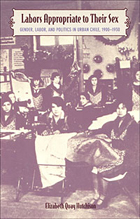
In addition to population and industrial censuses, Hutchison culls published and archival sources to illuminate such misconceptions and to reveal how women’s paid labor became a locus of anxiety for a society confronting social problems—both real and imagined—that were linked to industrialization and modernization. The limited options of working women were viewed by politicians, elite women, industrialists, and labor organizers as indicative of a society in crisis, she claims, yet their struggles were also viewed as the potential springboard for reform. Labors Appropriate to Their Sex thus demonstrates how changing norms concerning gender and work were central factors in conditioning the behavior of both male and female workers, relations between capital and labor, and political change and reform in Chile.
This study will be rewarding for those whose interests lie in labor, gender, or Latin American studies; as well as for those concerned with the histories of early feminism, working-class women, and sexual discrimination in Latin America.
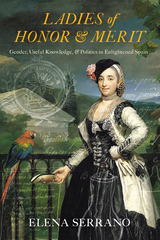
In the late eighteenth century, enlightened politicians and upper-class women in Spain debated the right of women to join one of the country’s most prominent scientific institutions: the Madrid Economic Society of Friends of the Country. Societies such as these, as Elena Serrano describes in her book, were founded on the idea that laypeople could contribute to the advancement of their country by providing “useful knowledge,” and their fellows often referred to themselves as improvers, or friends of the country. After intense debates, the duchess of Benavente, along with nine distinguished ladies, claimed, won, and exercised the right of women to participate in shaping the future of their nation by inaugurating the Junta de Damas de Honor y Mérito, or the Committee of Ladies of Honor and Merit. Ten years later, the Junta established a network of over sixty correspondents extending from Tenerife to Asturias and Austria to Cuba. With this book, Serrano tells the unknown story of how the duchess and her peers—who succeeded in creating the only known female branch among some five hundred patriotic societies in the eighteenth century—shaped Spanish scientific culture. Her study reveals how the Junta, by stressing the value of their feminine nature in their efforts to reform education, rural economy, and the poor, produced and circulated useful knowledge and ultimately crystallized the European improvement movement in Spain within an otherwise all-male context.
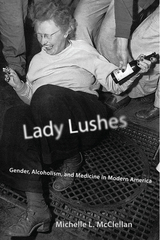
In Lady Lushes, medical historian Michelle L. McClellan traces the story of the female alcoholic from the late-nineteenth through the twentieth century. She draws on a range of sources to demonstrate the persistence of the belief that alcohol use is antithetical to an idealized feminine role, particularly one that glorifies motherhood. Lady Lushes offers a fresh perspective on the importance of gender role ideology in the formation of medical knowledge and authority.
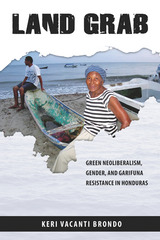
Employing approaches from feminist political ecology, critical race studies, and ethnic studies,Keri Vacanti Brondo illuminates three contemporary development paradoxes in Honduras: the recognition of the rights of indigenous people at the same time as Garifuna are being displaced in the name of development; the privileging of foreign research tourists in projects that promote ecotourism but result in restricting Garifuna from traditional livelihoods; and the contradictions in Garifuna land-rights claims based on native status when mestizos are reserving rights to resources as natives themselves.

Not a book about what Beowulf means but how it means, and how the reader participates in the process of meaning construction.
Overing’s primary aim is to address the poem on its own terms, to trace and develop an interpretive strategy consonant with the extent of its difference. Beowulf’s arcane structure describes cyclical repetitions and patterned intersections of themes which baffle a linear perspective, and suggest instead the irresolution and dynamism of the deconstructionist free play of textual elements.
Chapter 1 posits the self/reader as a function of the text/language, examining the ways in which the text "speaks" the reader. Chapter 2 develops an interactive semiotic strategy in an attempt to describe an isomorphic relation between poem and reader, between text and self. Chapter 3 addresses the notions of text and self as more complex functions or formulations of desire, and thus complicates and expands the arguments of the two preceding chapters. The final chapter examines the issue of desire in the poem, and, to a lesser extent, desire in the reader (insofar as these may legitimately be viewed as distinct from each other).
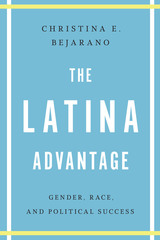
During the past decade, racial/ethnic minority women have made significant strides in U.S. politics, comprising large portions of their respective minority delegations both in Congress and in state legislatures. This trend has been particularly evident in the growing political presence of Latinas, yet scholars have offered no clear explanations for this electoral phenomenon—until now.
In The Latina Advantage, Christina E. Bejarano draws on national public opinion datasets and a close examination of state legislative candidates in Texas and California to demonstrate the new power of the political intersection between race and gender. Underscoring the fact that racial/ethnic minority women form a greater share of minority representatives than do white women among white elected officials, Bejarano provides empirical evidence to substantiate previous theoretical predictions of the strategic advantage in the intersectionality of gender and ethnicity in Latinas. Her evidence indicates that two factors provide the basis for the advantage: increasingly qualified candidates and the softening of perceived racial threat, leading minority female candidates to encounter fewer disadvantages than their male counterparts.
Overturning the findings of classic literature that reinforce stereotypes and describe minority female political candidates as being at a compounded electoral disadvantage, Bejarano brings a crucial new perspective to dialogues about the rapidly shifting face of America’s electorate.

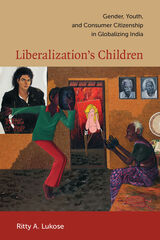
Moving beyond elite figurations of globalizing Indian youth, Lukose draws on ethnographic research to examine how non-elite college students in the southern state of Kerala mediate region, nation, and globe. Kerala sits at the crossroads of development and globalization. Held up as a model of left-inspired development, it has also been transformed through an extensive and largely non-elite transnational circulation of labor, money, and commodities to the Persian Gulf and elsewhere. Focusing on fashion, romance, student politics, and education, Lukose carefully tracks how gender, caste, and class, as well as colonial and postcolonial legacies of culture and power, affect how students navigate their roles as citizens and consumers. She explores how mass-mediation and an expanding commodity culture have differentially incorporated young people into the structures and aspirational logics of globalization.
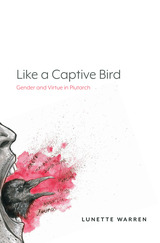
The full extent of Plutarch’s moral educational program remains largely understudied, at least in those aspects pertaining to women and the gendered other. As a result, scholarship on his views on women have differed significantly in their conclusions, with some scholars suggesting that he is overwhelmingly positive towards women and marriage and perhaps even a “precursor to feminism,” and others arguing that he was rather negative on the issue. Like a Captive Bird: Gender and Virtue in Plutarch is an examination of these educational methods employed in Plutarch’s work to regulate the expression of gender identity in women and men. In six chapters, author Lunette Warren analyzes Plutarch’s ideas about women and gender in Moralia and Lives. The book examines the divergences between real and ideal, the aims and methods of moral philosophy and psychagogic practice as they relate to identity formation, and Plutarch’s theoretical philosophy and metaphysics.
Warren argues that gender is a flexible mode of being that expresses a relation between body and soul, and that gender and virtue are inextricably entwined. Plutarch’s expression of gender is also an expression of a moral condition that signifies relationships of power, Warren claims, especially power relationships between the husband and wife. Uncovered in these texts is evidence of a redistribution of power, which allows some women to dominate other women and, in rare cases, men too. Like a Captive Bird offers a unique and fresh interpretation of Plutarch’s metaphysics which centers gender as one of the organizational principles of nature. It is aimed at scholars of Plutarch, ancient philosophy, and ancient gender studies, especially those who are interested in feminist studies of antiquity.
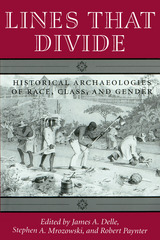
The division of human society by race, class, and gender has been addressed by scholars in many of the social sciences. Now historical archaeologists are demonstrating how material culture can be used to examine the processes that have erected boundaries between people.
Drawing on case studies from around the world, the essays in this volume highlight diverse moments in the rise of capitalist civilization both in Western Europe and its colonies. In the first section, the contributors address the dynamics of the racial system that emerged from European colonialism. They show how archaeological remains shed light on the institution of slavery in the American Southeast, on the treatment of Native Americans by Mormon settlers, and on the color line in colonial southern Africa. The next group of articles considers how gender was negotiated in nineteenth-century New York City, in colonial Ecuador, and on Jamaican coffee plantations. A final section focuses on the issue of class division by examining the built environment of eighteenth-century Catalonia and material remains and housing from early industrial Massachusetts.
These essays constitute an archaeology of capitalism and clearly demonstrate the importance of history in shaping cultural consciousness. Arguing that material culture is itself an active agent in the negotiation of social difference, they reveal the ways in which historical archaeologists can contribute to both the definition and dismantling of the lines that divide.
The Editors: James A. Delle is an assistant professor of anthropology at Franklin and Marshall College and the author of An Archaeology of Social Space: Analyzing Coffee Plantations in Jamaica's Blue Mountains.
Stephen A. Mrozowski is an associate professor of anthropology at the University of Massachusetts–Boston, director of the Andrew Fiske Memorial Center for Archaeological Research, and co-author of Living on the Boott: Historical Archaeology of the Boott Cotton Mills, Lowell, Massachusetts.
Robert Paynter is a professor of anthropology at the University of Massachusetts–Amherst, author of Models of Spatial Inequality, and co-editor of The Archaeology of Inequality.
The Contributors: Marjorie R. Abel, Mark Bograd, James A. Delle, Terrence W. Epperson, William B. Fawcett, Ross W. Jamieson, David L. Larsen, Walter Robert Lewelling, Patricia Hart Mangan, Stephen A. Mrozowski, Michael S. Nassaney, Thomas C. Patterson, Robert Paynter, Warren Perry, Paul A. Shackel, Theresa A. Singleton, Diana diZerega Wall.
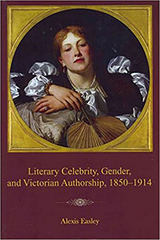
This study examines literary celebrity in Britain from 1850 to 1914. Through lively analysis of rare cultural materials, Easley demonstrates the crucial role of the celebrity author in the formation of British national identity. As Victorians toured the homes and haunts of famous writers, they developed a sense of shared national heritage. At the same time, by reading sensational accounts of writers’ lives, they were able to reconsider conventional gender roles and domestic arrangements. As women were featured in interviews and profiles, they were increasingly associated with the ephemerality of the popular press and were often excluded from emerging narratives of British literary history, which defined great literature as having a timeless appeal. Nevertheless, women writers were able to capitalize on celebrity media as a way of furthering their own careers and retelling history on their own terms. Press attention had a more positive effect on men’s literary careers since they were expected to assume public identities; however, in some cases, media exposure had the effect of sensationalizing their lives, bodies, and careers. With the development of proto-feminist criticism and historiography, the life stories of male writers were increasingly used to expose unhealthy domestic relationships and imagine ideal forms of British masculinity.
The first section of Literary Celebrity explores the practice of literary tourism in Victorian Britain, focusing specifically on the homes and haunts of Charles Dickens, Christina Rossetti, George Eliot, Elizabeth Barrett Browning, and Harriet Martineau. This investigation incorporates analysis of fascinating cultural texts, including maps, periodicals, and tourist guidebooks. Easley links the practice of literary tourism to a variety of cultural developments, including nationalism, urbanization, spiritualism, the women’s movement, and the expansion of popular print culture. The second section provides fresh insight into the ways that celebrity culture informed the development of Victorian historiography. Easley demonstrates how women were able to re-tell history from a proto-feminist perspective by writing contemporary history, participating in architectural reform movements, and becoming active in literary societies. In this chapter she returns to the work of Harriet Martineau and introduces a variety of lesser-known contributors to the field, including Mary Gillies and Mary Ward. Literary Celebrity concludes with a third section focused on the expansion of celebrity media at the fin de siècle. These chapters and a brief coda link the popularization of celebrity news to the de-canonization of women writers, the professionalization of medicine, the development of the open space movement, and the institutionalization of English studies. These investigations elucidate the role of celebrity media in the careers of Charlotte Robinson, Marie Corelli, Mary Braddon, Harriet Martineau, Thomas Carlyle, Ernest Hart, and Octavia Hill.
Published by University of Delaware Press. Distributed worldwide by Rutgers University Press.
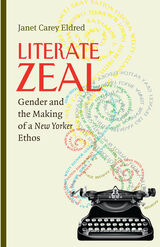
In Literate Zeal, Janet Carey Eldred examines the rise of women magazine editors during the mid-twentieth century and reveals their unheralded role in creating a literary aesthetic for the American public. Between the sheets of popular magazines, editors offered belles-lettres to the masses and, in particular, middle-class women. Magazines became a place to find culture, humor, and intellectual affirmation alongside haute couture.
Eldred mines a variety of literary archives, notably the correspondence of Katharine Sargeant White of the New Yorker, to provide an insider’s view of the publisher-editor-author dynamic. Here, among White’s letters, memos, and markups, we see the deliberate shaping of literature to create a New Yorker ethos. Through her discrete phrasing, authors are coaxed by White to correct or wholly revise their work. Stories or poems by famous writers are rejected for being “dizzying” or “too literate.” With a surgeon’s skill, “disturbing” issues such as sexuality and race are extracted from manuscripts.
Eldred chronicles the work of women (and a few men) editors at the major women’s magazines of the day. Ladies’ Home Journal, Mademoiselle, Vogue, and others enacted an editorial style similar to that of the New Yorker by offering literature, values, and culture to an educated and aspiring middle class. Publishers effectively convinced readers that middlebrow stories (and by association their audience) had much loftier pursuits. And they were right. These publications created and sustained a mass literacy never before seen in American publishing.
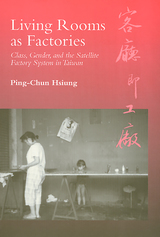
In Taiwan, small-scale subcontracting factories of thirty employees or less make items for export, like the wooden jewelry boxes that Ping-Chun Hsiung made when she worked in six such factories. These factories are found in rice fields and urban areas, front yards and living rooms, mostly employing married women in line with the government slogan that promotes work in the home—"Living Rooms as Factories."
Hsiung studies the experiences of the married women who work in this satellite system of factories, and how their work and family lives have contributed to Taiwan's 9.1 percent GNP growth over the last three decades, the "economic miracle." This vivid portrayal of the dual lives of these women as wives, mothers, daughters-in-law and as manufacturing workers also provides sophisticated analyses of the links between class and gender stratification, family dynamics, state policy, and global restructuring within the process of industrialization.
Hsiung uses ethnographic data to illustrate how, in this system of intersecting capitalist logic and patriarchal practices, some Taiwanese women experience upward mobility by marrying into the owners' family, while others remain home and wage workers. Although women in both groups acknowledge gender inequality, this commonality does not bridge divergent class affiliations. Along with a detailed account of the oppressive labor practices, this book reveals how workers employ clandestine tactics to defy the owners' claims on their labor.
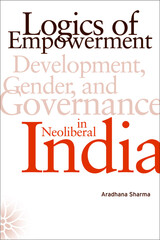
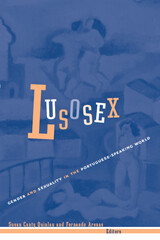
READERS
Browse our collection.
PUBLISHERS
See BiblioVault's publisher services.
STUDENT SERVICES
Files for college accessibility offices.
UChicago Accessibility Resources
home | accessibility | search | about | contact us
BiblioVault ® 2001 - 2024
The University of Chicago Press









